Words Amicia de Moubray Photographs Elvis & Kresse
A visit to Elvis & Kresse’s new workshop near Faversham is to enter an all-embracing, 21st century, environmentally-conscious way of living and working.
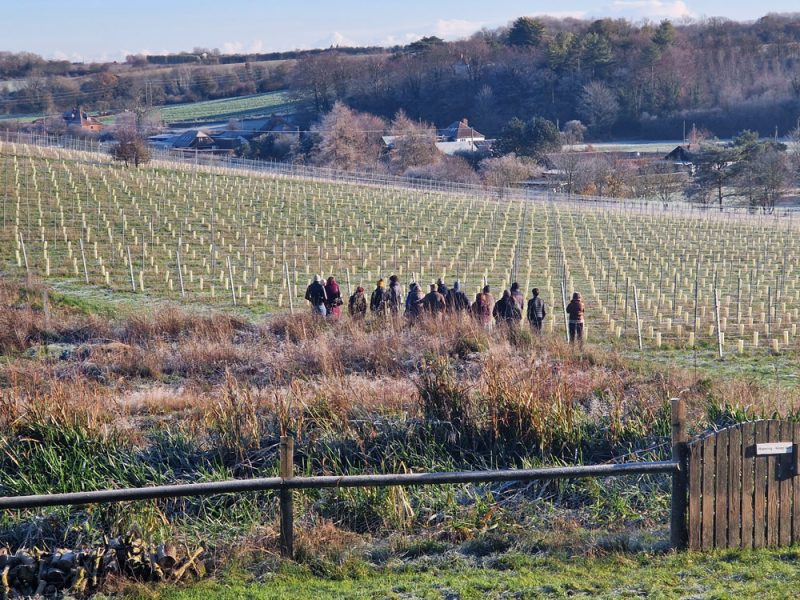
Looking across the 12,000 vines
The drive and energy of Kresse Wesling and her partner Elvis, is both astonishing and infectious. Four years on from Faversham Life’s first visit to Elvis & Kresse (April 2019), the company has relocated to a vast purpose-built barn. Stepping inside on a dreary February day I was immediately struck by the cathedral-like proportions: soaring ceilings and generously proportioned windows all enveloped in toasty warmth. The barn is insulated with straw bales and has 28 solar panels.
Kresse says: ‘We ran out of room at Tonge Mill. Initially we thought it would be easy to buy an old farm with some agricultural buildings we could convert – but we were under a misapprobration that diversification would make planning easier.’
In late 2020, they bought 17 acres of Grade 3 agricultural land in Painters Forstal classified as ‘land with moderate limitations’.
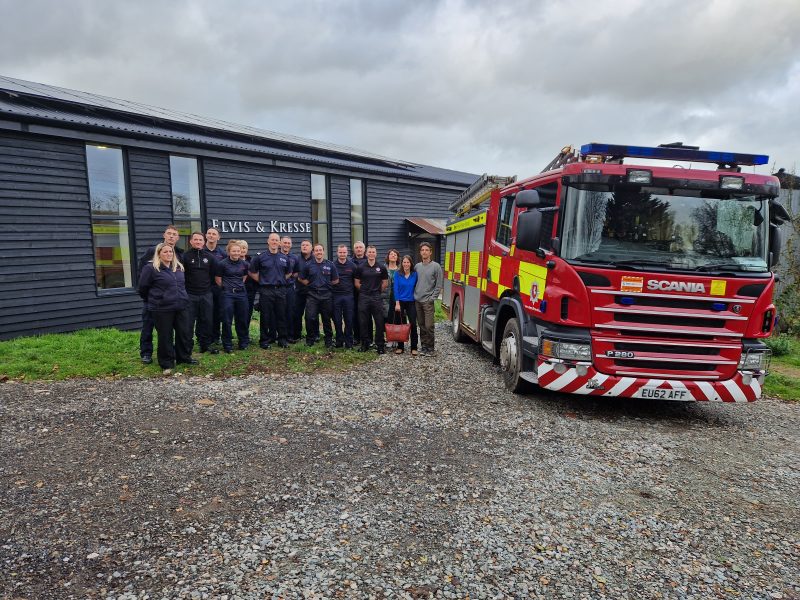
Elvis & Kresse are renowned internationally for their stylish bags and accessories created with discarded fire hose
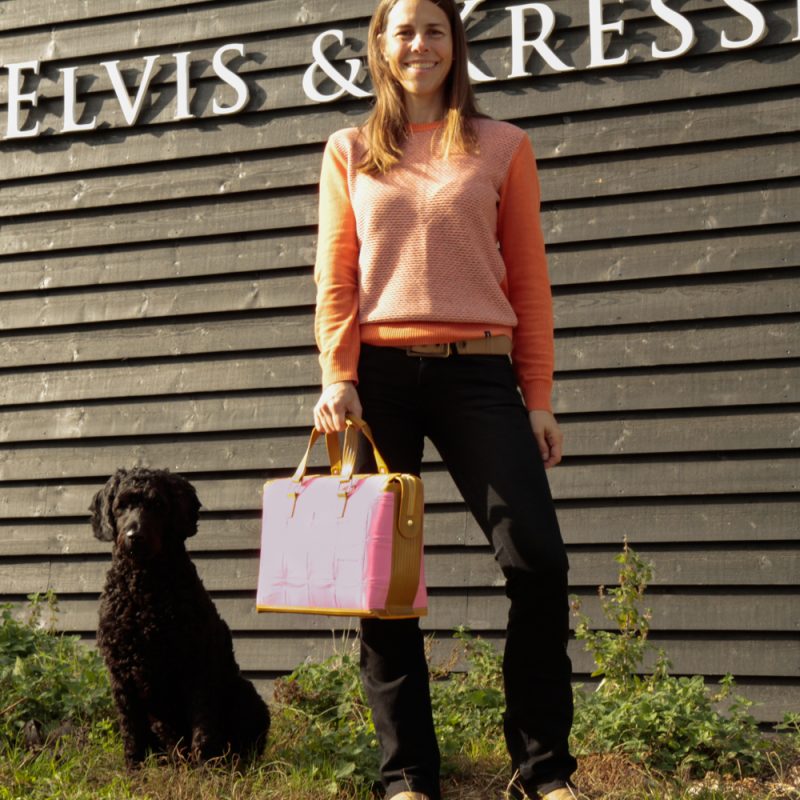
Kresse and Monty outside the new workshop
It quickly transpires that it is not just the workshop that has changed but the couple’s raison d’etre. Internationally lauded as purveyors of stylish bags and accessories made from discarded fire hoses – thus saving them from landfill – they are now equally passionate about improving the biodiversity and carbon sequestration of their land. ‘There weren’t even any earthworms when we arrived. Soil is king!’ says Kresse.
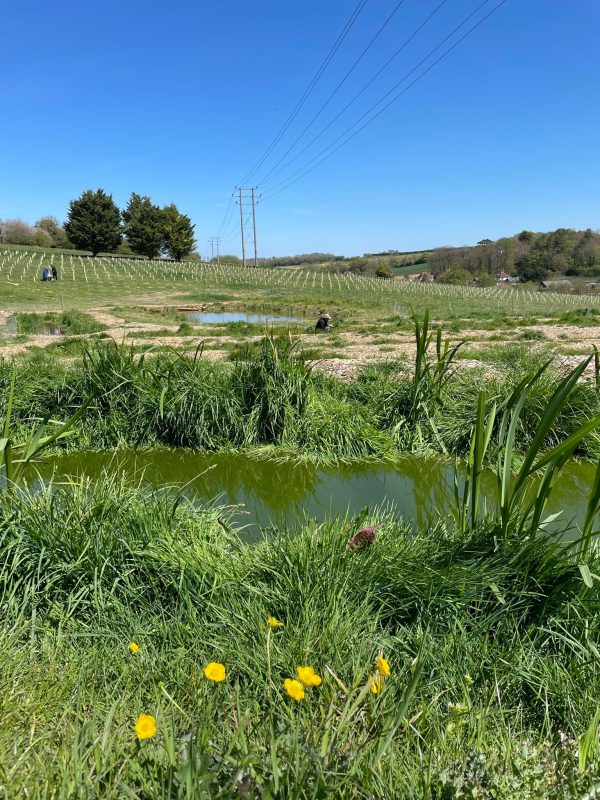
One of the wetland waste management system ponds
They have installed an impressive wetland waste management system complete with a series of ponds. This has already had a dramatic effect on creating greater biodiversity. It is so efficient that Kresse often likes to take a dip in the summer months. They also make their own tea compost – a liquid produced by extracting good microbes, bacteria and so on using a brewing process.
When I ask Kresse if she can already see the changes in the land, she says almost tearfully: ‘I become rather emotional about this as we’re seeing changes daily.’ To give one example, there are now lots of dung beetles.
The couple don’t come from farming backgrounds so, Elvis says: ‘We have the freedom to pursue new methods.’ They have planted by hand a fascinating regenerative vineyard of 12,000 vines of a Piwi type of grape, bred in Germany specifically to withstand the humidity of northern climates. ‘We didn’t want it to be a monocrop but to encourage biodiversity.’ To this end, a herd of Dorper sheep mob-graze the vineyard: an intensive rotational system allowing land to rest for longer, mimicking the effect of the natural behaviour of herds and wildlife.
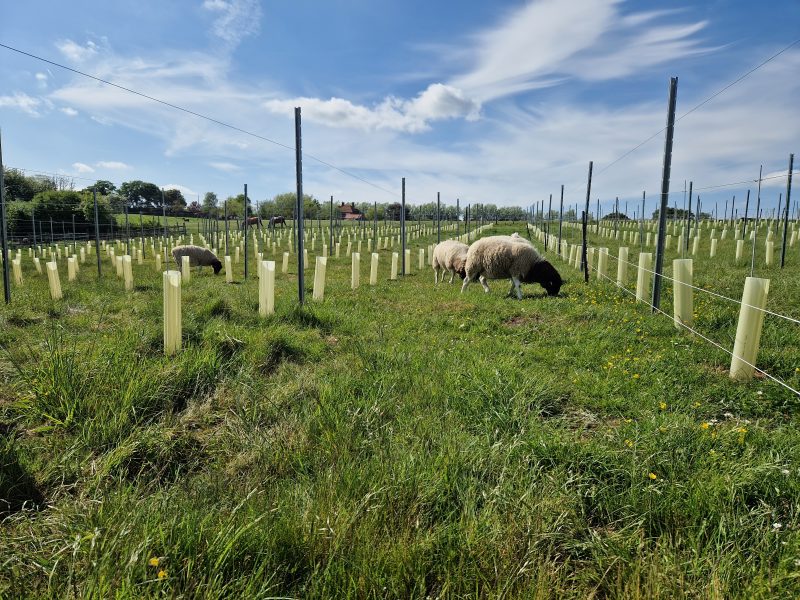
A flock of Dorf sheep grazing in the regenerative vineyard
The fruiting wire is much higher than a conventional vineyard and the vines are planted in rows three metres apart – much wider then in traditional vineyards – making space for the sheep to graze. The sheep recycle nutrients and browse suckers and shoot tips.
I asked them how they had gained the knowledge to regenerate the land. ‘The beauty of lockdown was that we had lots of time to do research,’ they said. ‘We were very inspired by the podcasts of Kelly Mulville, a leading proponent of combining viticulture with holistic grazing based at Paicines Ranch, California.’ Thrillingly Kelly replied immediately to an email they sent asking them to meet him via Zoom. ‘He is like a rockstar to us!’
A large part of their philosophy is to share their knowledge, encouraging other farmers and landowners to follow their example. ‘Just think how amazing Kent could be ecologically!’
With its prolonged heatwave, 2022 couldn’t have been a tougher year to start a vineyard. Elvis and Kresse found themselves handwatering every single vine from the rainwater harvesting ponds. It took 10 days each time and they did the exercise six times. It was round the clock work, as well as planting a wide assortment of 5,000 trees and shrubs. The new building project was no easier, with the challenge of sourcing materials in an industry hit by Covid, Brexit and the war in the Ukraine.
If you want to learn more about this riveting enterprise why not enrol on a Farm Tour.
Text: Amicia de Moubray Photographs: Elvis & Kresse